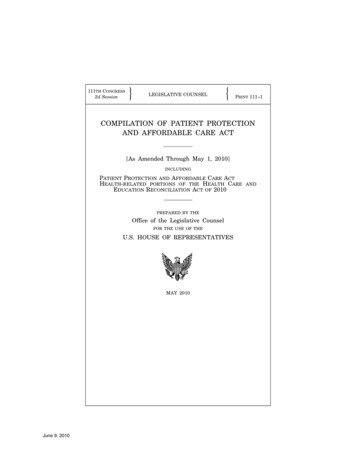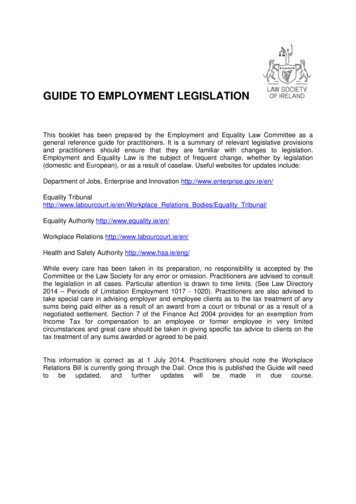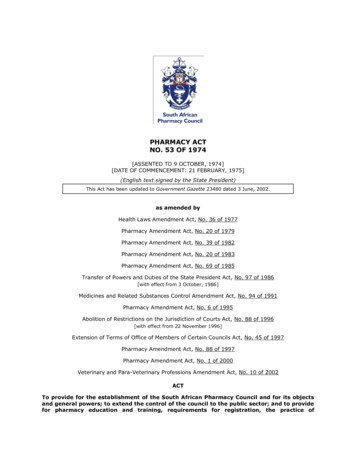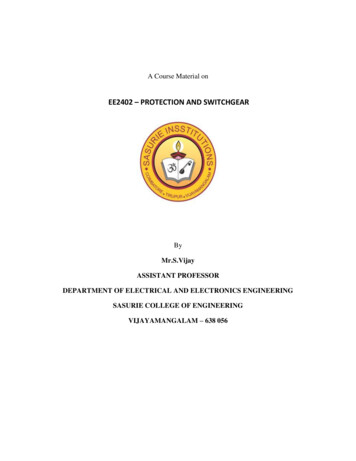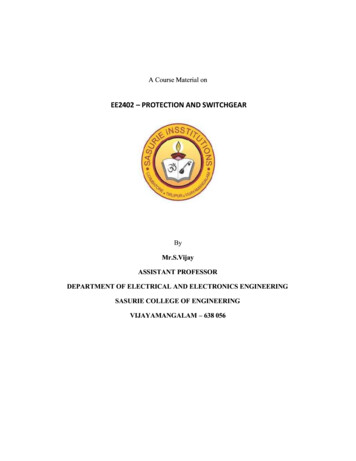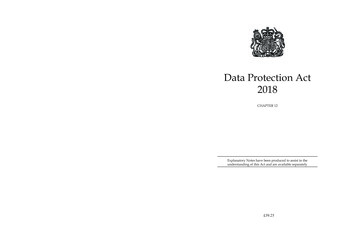
Transcription
Data Protection Act2018DATA PROTECTION ACT 2018CHAPTER 12Explanatory Notes have been produced to assist in theunderstanding of this Act and are available separatelyPublished by TSO (The Stationery Office), part of Williams Lea Tag, andavailable from:Onlinewww.tsoshop.co.ukMail, Telephone, Fax & E-mailTSOPO Box 29, Norwich, NR3 1GNTelephone orders/General enquiries: 0333 202 5070Fax orders: 0333 202 5080E-mail: customer.services@tso.co.ukTextphone: 0333 202 5077 39.25TSO@Blackwell and other Accredited Agentsukpgacvr 20180012 en.indd 124/05/2018 10:47
Data Protection Act 2018CHAPTER 12CONTENTSPART 1PRELIMINARY123OverviewProtection of personal dataTerms relating to the processing of personal dataPART 2GENERAL PROCESSINGCHAPTER 1SCOPE AND DEFINITIONS45Processing to which this Part appliesDefinitionsCHAPTER 2THE GDPRMeaning of certain terms used in the GDPR67Meaning of “controller”Meaning of “public authority” and “public body”Lawfulness of processing89Lawfulness of processing: public interest etcChild’s consent in relation to information society services
iiData Protection Act 2018 (c. 12)Special categories of personal data1011Special categories of personal data and criminal convictions etc dataSpecial categories of personal data etc: supplementaryRights of the data subject121314Limits on fees that may be charged by controllersObligations of credit reference agenciesAutomated decision-making authorised by law: safeguardsRestrictions on data subject's rights1516Exemptions etcPower to make further exemptions etc by regulationsAccreditation of certification providers17Accreditation of certification providersTransfers of personal data to third countries etc18Transfers of personal data to third countries etcSpecific processing situations19Processing for archiving, research and statistical purposes: safeguardsMinor definition20Meaning of “court”CHAPTER 3OTHER GENERAL PROCESSINGScope21Processing to which this Chapter appliesApplication of the GDPR2223Application of the GDPR to processing to which this Chapter appliesPower to make provision in consequence of regulations related to the GDPRExemptions etc2425262728Manual unstructured data held by FOI public authoritiesManual unstructured data used in longstanding historical researchNational security and defence exemptionNational security: certificateNational security and defence: modifications to Articles 9 and 32 of theapplied GDPR
iiiData Protection Act 2018 (c. 12)PART 3LAW ENFORCEMENT PROCESSINGCHAPTER 1SCOPE AND DEFINITIONSScope29Processing to which this Part appliesDefinitions30313233Meaning of “competent authority”“The law enforcement purposes”Meaning of “controller” and “processor”Other definitionsCHAPTER 2PRINCIPLES343536373839404142Overview and general duty of controllerThe first data protection principleThe second data protection principleThe third data protection principleThe fourth data protection principleThe fifth data protection principleThe sixth data protection principleSafeguards: archivingSafeguards: sensitive processingCHAPTER 3RIGHTS OF THE DATA SUBJECTOverview and scope43Overview and scopeInformation: controller's general duties44Information: controller’s general dutiesData subject's right of access45Right of access by the data subjectData subject's rights to rectification or erasure etc464748Right to rectificationRight to erasure or restriction of processingRights under section 46 or 47: supplementary
ivData Protection Act 2018 (c. 12)Automated individual decision-making4950Right not to be subject to automated decision-makingAutomated decision-making authorised by law: safeguardsSupplementary51525354Exercise of rights through the CommissionerForm of provision of information etcManifestly unfounded or excessive requests by the data subjectMeaning of “applicable time period”CHAPTER 4CONTROLLER AND PROCESSOROverview and scope55Overview and scopeGeneral obligations56575859606162636465General obligations of the controllerData protection by design and defaultJoint controllersProcessorsProcessing under the authority of the controller or processorRecords of processing activitiesLoggingCo-operation with the CommissionerData protection impact assessmentPrior consultation with the CommissionerObligations relating to security66Security of processingObligations relating to personal data breaches6768Notification of a personal data breach to the CommissionerCommunication of a personal data breach to the data subjectData protection officers697071Designation of a data protection officerPosition of data protection officerTasks of data protection officerCHAPTER 5TRANSFERS OF PERSONAL DATA TO THIRD COUNTRIES ETCOverview and interpretation72Overview and interpretation
vData Protection Act 2018 (c. 12)General principles for transfers73747576General principles for transfers of personal dataTransfers on the basis of an adequacy decisionTransfers on the basis of appropriate safeguardsTransfers on the basis of special circumstancesTransfers to particular recipients77Transfers of personal data to persons other than relevant authoritiesSubsequent transfers78Subsequent transfersCHAPTER 6SUPPLEMENTARY798081National security: certificateSpecial processing restrictionsReporting of infringementsPART 4INTELLIGENCE SERVICES PROCESSINGCHAPTER 1SCOPE AND DEFINITIONSScope82Processing to which this Part appliesDefinitions8384Meaning of “controller” and “processor”Other definitionsCHAPTER 2PRINCIPLESOverview85OverviewThe data protection principles8687888990The first data protection principleThe second data protection principleThe third data protection principleThe fourth data protection principleThe fifth data protection principle
viData Protection Act 2018 (c. 12)91The sixth data protection principleCHAPTER 3RIGHTS OF THE DATA ght to informationRight of accessRight of access: supplementaryRight not to be subject to automated decision-makingRight to intervene in automated decision-makingRight to information about decision-makingRight to object to processingRights to rectification and erasureCHAPTER 4CONTROLLER AND PROCESSOROverview101OverviewGeneral obligations102103104105106General obligations of the controllerData protection by designJoint controllersProcessorsProcessing under the authority of the controller or processorObligations relating to security107Security of processingObligations relating to personal data breaches108Communication of a personal data breachCHAPTER 5TRANSFERS OF PERSONAL DATA OUTSIDE THE UNITED KINGDOM109Transfers of personal data outside the United Kingdom
viiData Protection Act 2018 (c. 12)CHAPTER 6EXEMPTIONS110111112113National securityNational security: certificateOther exemptionsPower to make further exemptionsPART 5THE INFORMATION COMMISSIONERThe Commissioner114The Information CommissionerGeneral functions115116117General functions under the GDPR and safeguardsOther general functionsCompetence in relation to courts etcInternational role118119120Co-operation and mutual assistanceInspection of personal data in accordance with international obligationsFurther international roleCodes of practice121122123124125126127128Data-sharing codeDirect marketing codeAge-appropriate design codeData protection and journalism codeApproval of codes prepared under sections 121 to 124Publication and review of codes issued under section 125(4)Effect of codes issued under section 125(4)Other codes of practiceConsensual audits129Consensual auditsRecords of national security certificates130Records of national security certificatesInformation provided to the Commissioner131132133Disclosure of information to the CommissionerConfidentiality of informationGuidance about privileged communications
viiiData Protection Act 2018 (c. 12)Fees134135136Fees for servicesManifestly unfounded or excessive requests by data subjects etcGuidance about feesCharges137138Charges payable to the Commissioner by controllersRegulations under section 137: supplementaryReports etc139140141Reporting to ParliamentPublication by the CommissionerNotices from the CommissionerPART 6ENFORCEMENTInformation notices142143144145Information noticesInformation notices: restrictionsFalse statements made in response to information noticesInformation ordersAssessment notices146147Assessment noticesAssessment notices: restrictionsInformation notices and assessment notices: destruction of documents etc148Destroying or falsifying information and documents etcEnforcement notices149150151152153Enforcement noticesEnforcement notices: supplementaryEnforcement notices: rectification and erasure of personal data etcEnforcement notices: restrictionsEnforcement notices: cancellation and variationPowers of entry and inspection154Powers of entry and inspectionPenalties155156157158Penalty noticesPenalty notices: restrictionsMaximum amount of penaltyFixed penalties for non-compliance with charges regulations
ixData Protection Act 2018 (c. 12)159Amount of penalties: supplementaryGuidance160161Guidance about regulatory actionApproval of first guidance about regulatory actionAppeals etc162163164Rights of appealDetermination of appealsApplications in respect of urgent noticesComplaints165166Complaints by data subjectsOrders to progress complaintsRemedies in the court167168169Compliance ordersCompensation for contravention of the GDPRCompensation for contravention of other data protection legislationOffences relating to personal data170171172173Unlawful obtaining etc of personal dataRe-identification of de-identified personal dataRe-identification: effectiveness testing conditionsAlteration etc of personal data to prevent disclosure to data subjectThe special purposes174175176177178179The special purposesProvision of assistance in special purposes proceedingsStaying special purposes proceedingsGuidance about how to seek redress against media organisationsReview of processing of personal data for the purposes of journalismEffectiveness of the media’s dispute resolution proceduresJurisdiction of courts180JurisdictionDefinitions181Interpretation of Part 6
xData Protection Act 2018 (c. 12)PART 7SUPPLEMENTARY AND FINAL PROVISIONRegulations under this Act182Regulations and consultationChanges to the Data Protection Convention183Power to reflect changes to the Data Protection ConventionRights of the data subject184185186Prohibition of requirement to produce relevant recordsAvoidance of certain contractual terms relating to health recordsData subject’s rights and other prohibitions and restrictionsRepresentation of data subjects187188189190Representation of data subjects with their authorityRepresentation of data subjects with their authority: collective proceedingsDuty to review provision for representation of data subjectsPost-review powers to make provision about representation of data subjectsFramework for Data Processing by Government191192193194Framework for Data Processing by GovernmentApproval of the FrameworkPublication and review of the FrameworkEffect of the FrameworkData-sharing: HMRC and reserve forces195Reserve forces: data-sharing by HMRCOffences196197198199200Penalties for offencesProsecutionLiability of directors etcRecordable offencesGuidance about PACE codes of practiceThe Tribunal201202203Disclosure of information to the TribunalProceedings in the First-tier Tribunal: contemptTribunal Procedure RulesInterpretation204205Meaning of “health professional” and “social work professional”General interpretation
xiData Protection Act 2018 (c. 12)206Index of defined expressionsTerritorial application207Territorial application of this ActGeneral208209210211Children in ScotlandApplication to the CrownApplication to ParliamentMinor and consequential provisionFinal212213214215CommencementTransitional provisionExtentShort titleSchedule 1 — Special categories of personal data and criminal convictionsetc dataPart 1 — Conditions relating to employment, health and research etcPart 2 — Substantial public interest conditionsPart 3 — Additional conditions relating to criminal convictions etcPart 4 — Appropriate policy document and additional safeguardsSchedule 2 — Exemptions etc from the GDPRPart 1 — Adaptations and restrictions based on Articles 6(3) and 23(1)Part 2 — Restrictions based on Article 23(1): restrictions of rules inArticles 13 to 21 and 34Part 3 — Restriction based on Article 23(1): protection of rights of othersPart 4 — Restrictions based on Article 23(1): restrictions of rules inArticles 13 to 15Part 5 — Exemptions etc based on Article 85(2) for reasons of freedomof expression and informationPart 6 — Derogations etc based on Article 89 for research, statistics andarchivingSchedule 3 — Exemptions etc from the GDPR: health, social work, educationand child abuse dataPart 1 — GDPR provisions to be restrictedPart 2 — Health dataPart 3 — Social work dataPart 4 — Education dataPart 5 — Child abuse dataSchedule 4 — Exemptions etc from the GDPR: disclosure prohibited orrestricted by an enactmentSchedule 5 — Accreditation of certification providers: reviews and appealsSchedule 6 — The applied GDPR and the applied Chapter 2Part 1 — Modifications to the GDPRPart 2 — Modifications to Chapter 2 of Part 2Schedule 7 — Competent authorities
xiiData Protection Act 2018 (c. 12)Schedule 8Schedule 9Schedule 10Schedule 11Schedule 12Schedule 13Schedule 14Part 1Part 2Schedule 15Schedule 16Schedule 17————————————Schedule 18Schedule 19Part 1Part 2Part 3Part 4Schedule 20Part 1Part 2Part 3Part 4Part 5Part 6Part 7Part 8Part onditions for sensitive processing under Part 3Conditions for processing under Part 4Conditions for sensitive processing under Part 4Other exemptions under Part 4The Information CommissionerOther general functions of the CommissionerCo-operation and mutual assistanceLaw Enforcement DirectiveData Protection ConventionPowers of entry and inspectionPenaltiesReview of processing of personal data for the purposes ofjournalismRelevant recordsMinor and consequential amendmentsAmendments of primary legislationAmendments of other legislationModificationsSupplementaryTransitional provision etcGeneralRights of data subjectsThe GDPR and Part 2 of this ActLaw enforcement and intelligence services processingNational security certificatesThe Information CommissionerEnforcement etc under the 1998 ActEnforcement etc under this ActOther enactments
ELIZABETH IIc. 12Data Protection Act 20182018 CHAPTER 12An Act to make provision for the regulation of the processing of informationrelating to individuals; to make provision in connection with the InformationCommissioner’s functions under certain regulations relating to information; tomake provision for a direct marketing code of practice; and for connectedpurposes.[23rd May 2018]Bby the Queen’s most Excellent Majesty, by and with the advice andconsent of the Lords Spiritual and Temporal, and Commons, in this presentParliament assembled, and by the authority of the same, as follows:—E IT ENACTEDPART 1PRELIMINARY1Overview(1)This Act makes provision about the processing of personal data.(2)Most processing of personal data is subject to the GDPR.(3)Part 2 supplements the GDPR (see Chapter 2) and applies a broadly equivalentregime to certain types of processing to which the GDPR does not apply (seeChapter 3).(4)Part 3 makes provision about the processing of personal data by competentauthorities for law enforcement purposes and implements the LawEnforcement Directive.(5)Part 4 makes provision about the processing of personal data by theintelligence services.(6)Part 5 makes provision about the Information Commissioner.(7)Part 6 makes provision about the enforcement of the data protectionlegislation.
2Data Protection Act 2018 (c. 12)Part 1 — Preliminary(8)2Part 7 makes supplementary provision, including provision about theapplication of this Act to the Crown and to Parliament.Protection of personal data(1)The GDPR, the applied GDPR and this Act protect individuals with regard tothe processing of personal data, in particular by—(a) requiring personal data to be processed lawfully and fairly, on the basisof the data subject’s consent or another specified basis,(b) conferring rights on the data subject to obtain information about theprocessing of personal data and to require inaccurate personal data tobe rectified, and(c) conferring functions on the Commissioner, giving the holder of thatoffice responsibility for monitoring and enforcing their provisions.(2)When carrying out functions under the GDPR, the applied GDPR and this Act,the Commissioner must have regard to the importance of securing anappropriate level of protection for personal data, taking account of the interestsof data subjects, controllers and others and matters of general public interest.3Terms relating to the processing of personal data(1)This section defines some terms used in this Act.(2)“Personal data” means any information relating to an identified or identifiableliving individual (subject to subsection (14)(c)).(3)“Identifiable living individual” means a living individual who can beidentified, directly or indirectly, in particular by reference to—(a) an identifier such as a name, an identification number, location data oran online identifier, or(b) one or more factors specific to the physical, physiological, genetic,mental, economic, cultural or social identity of the individual.(4)“Processing”, in relation to information, means an operation or set ofoperations which is performed on information, or on sets of information, suchas—(a) collection, recording, organisation, structuring or storage,(b) adaptation or alteration,(c) retrieval, consultation or use,(d) disclosure by transmission, dissemination or otherwise makingavailable,(e) alignment or combination, or(f) restriction, erasure or destruction,(subject to subsection (14)(c) and sections 5(7), 29(2) and 82(3), which makeprovision about references to processing in the different Parts of this Act).(5)“Data subject” means the identified or identifiable living individual to whompersonal data relates.(6)“Controller” and “processor”, in relation to the processing of personal data towhich Chapter 2 or 3 of Part 2, Part 3 or Part 4 applies, have the same meaningas in that Chapter or Part (see sections 5, 6, 32 and 83 and see also subsection(14)(d)).
Data Protection Act 2018 (c. 12)Part 1 — Preliminary3(7)“Filing system” means any structured set of personal data which is accessibleaccording to specific criteria, whether held by automated means or manuallyand whether centralised, decentralised or dispersed on a functional orgeographical basis.(8)“The Commissioner” means the Information Commissioner (see section 114).(9)“The data protection legislation” means—(a) the GDPR,(b) the applied GDPR,(c) this Act,(d) regulations made under this Act, and(e) regulations made under section 2(2) of the European Communities Act1972 which relate to the GDPR or the Law Enforcement Directive.(10)“The GDPR” means Regulation (EU) 2016/679 of the European Parliament andof the Council of 27 April 2016 on the protection of natural persons with regardto the processing of personal data and on the free movement of such data(General Data Protection Regulation).(11)“The applied GDPR” means the GDPR as applied by Chapter 3 of Part 2.(12)“The Law Enforcement Directive” means Directive (EU) 2016/680 of theEuropean Parliament and of the Council of 27 April 2016 on the protection ofnatural persons with regard to the processing of personal data by competentauthorities for the purposes of the prevention, investigation, detection orprosecution of criminal offences or the execution of criminal penalties, and onthe free movement of such data, and repealing Council Framework Decision2008/977/JHA.(13)“The Data Protection Convention” means the Convention for the Protection ofIndividuals with regard to Automatic Processing of Personal Data which wasopened for signature on 28 January 1981, as amended up to the day on whichthis Act is passed.(14)In Parts 5 to 7, except where otherwise provided—(a) references to the GDPR are to the GDPR read with Chapter 2 of Part 2and include the applied GDPR read with Chapter 3 of Part 2;(b) references to Chapter 2 of Part 2, or to a provision of that Chapter,include that Chapter or that provision as applied by Chapter 3 of Part 2;(c) references to personal data, and the processing of personal data, are topersonal data and processing to which Chapter 2 or 3 of Part 2, Part 3or Part 4 applies;(d) references to a controller or processor are to a controller or processor inrelation to the processing of personal data to which Chapter 2 or 3 ofPart 2, Part 3 or Part 4 applies.(15)There is an index of defined expressions in section 206.
4Data Protection Act 2018 (c. 12)Part 2 — General processingChapter 1 — Scope and definitionsPART 2GENERAL PROCESSINGCHAPTER 1SCOPE AND DEFINITIONS4Processing to which this Part applies(1)This Part is relevant to most processing of personal data.(2)Chapter 2 of this Part—(a) applies to the types of processing of personal data to which the GDPRapplies by virtue of Article 2 of the GDPR, and(b) supplements, and must be read with, the GDPR.(3)Chapter 3 of this Part—(a) applies to certain types of processing of personal data to which theGDPR does not apply (see section 21), and(b) makes provision for a regime broadly equivalent to the GDPR to applyto such processing.5Definitions(1)Terms used in Chapter 2 of this Part and in the GDPR have the same meaningin Chapter 2 as they have in the GDPR.(2)In subsection (1), the reference to a term’s meaning in the GDPR is to itsmeaning in the GDPR read with any provision of Chapter 2 which modifies theterm’s meaning for the purposes of the GDPR.(3)Subsection (1) is subject to any provision in Chapter 2 which providesexpressly for the term to have a different meaning and to section 204.(4)Terms used in Chapter 3 of this Part and in the applied GDPR have the samemeaning in Chapter 3 as they have in the applied GDPR.(5)In subsection (4), the reference to a term’s meaning in the applied GDPR is toits meaning in the GDPR read with any provision of Chapter 2 (as applied byChapter 3) or Chapter 3 which modifies the term’s meaning for the purposesof the applied GDPR.(6)Subsection (4) is subject to any provision in Chapter 2 (as applied by Chapter3) or Chapter 3 which provides expressly for the term to have a differentmeaning.(7)A reference in Chapter 2 or Chapter 3 of this Part to the processing of personaldata is to processing to which the Chapter applies.(8)Sections 3 and 205 include definitions of other expressions used in this Part.
5Data Protection Act 2018 (c. 12)Part 2 — General processingChapter 2 — The GDPRCHAPTER 2THE GDPRMeaning of certain terms used in the GDPR6Meaning of “controller”(1)The definition of “controller” in Article 4(7) of the GDPR has effect subject to—(a) subsection (2),(b) section 209, and(c) section 210.(2)For the purposes of the GDPR, where personal data is processed only—(a) for purposes for which it is required by an enactment to be processed,and(b) by means by which it is required by an enactment to be processed,the person on whom the obligation to process the data is imposed by theenactment (or, if different, one of the enactments) is the controller.7Meaning of “public authority” and “public body”(1)For the purposes of the GDPR, the following (and only the following) are“public authorities” and “public bodies” under the law of the UnitedKingdom—(a) a public authority as defined by the Freedom of Information Act 2000,(b) a Scottish public authority as defined by the Freedom of Information(Scotland) Act 2002 (asp 13), and(c) an authority or body specified or described by the Secretary of State inregulations,subject to subsections (2), (3) and (4).(2)An authority or body that falls within subsection (1) is only a “publicauthority” or “public body” for the purposes of the GDPR when performing atask carried out in the public interest or in the exercise of official authorityvested in it.(3)The references in subsection (1)(a) and (b) to public authorities and Scottishpublic authorities as defined by the Freedom of Information Act 2000 and theFreedom of Information (Scotland) Act 2002 (asp 13) do not include any of thefollowing that fall within those definitions—(a) a parish council in England;(b) a community council in Wales;(c) a community council in Scotland;(d) a parish meeting constituted under section 13 of the Local GovernmentAct 1972;(e) a community meeting constituted under section 27 of that Act;(f) charter trustees constituted—(i) under section 246 of that Act,(ii) under Part 1 of the Local Government and Public Involvementin Health Act 2007, or(iii) by the Charter Trustees Regulations 1996 (S.I. 1996/263).
6Data Protection Act 2018 (c. 12)Part 2 — General processingChapter 2 — The GDPR(4)The Secretary of State may by regulations provide that a person specified ordescribed in the regulations that is a public authority described in subsection(1)(a) or (b) is not a “public authority” or “public body” for the purposes of theGDPR.(5)Regulations under this section are subject to the affirmative resolutionprocedure.Lawfulness of processing8Lawfulness of processing: public interest etcIn Article 6(1) of the GDPR (lawfulness of processing), the reference in point (e)to processing of personal data that is necessary for the performance of a taskcarried out in the public interest or in the exercise of the controller’s officialauthority includes processing of personal data that is necessary for—(a) the administration of justice,(b) the exercise of a function of either House of Parliament,(c) the exercise of a function conferred on a person by an enactment or ruleof law,(d) the exercise of a function of the Crown, a Minister of the Crown or agovernment department, or(e) an activity that supports or promotes democratic engagement.9Child’s consent in relation to information society servicesIn Article 8(1) of the GDPR (conditions applicable to child’s consent in relationto information society services)—(a) references to “16 years” are to be read as references to “13 years”, and(b) the reference to “information society services” does not includepreventive or counselling services.Special categories of personal data10Special categories of personal data and criminal convictions etc data(1)Subsections (2) and (3) make provision about the processing of personal datadescribed in Article 9(1) of the GDPR (prohibition on processing of specialcategories of personal data) in reliance on an exception in one of the followingpoints of Article 9(2)—(a) point (b) (employment, social security and social protection);(b) point (g) (substantial public interest);(c) point (h) (health and social care);(d) point (i) (public health);(e) point (j) (archiving, research and statistics).(2)The processing meets the requirement in point (b), (h), (i) or (j) of Article 9(2)of the GDPR for authorisation by, or a basis in, the law of the United Kingdomor a part of the United Kingdom only if it meets a condition in Part 1 ofSchedule 1.
7Data Protection Act 2018 (c. 12)Part 2 — General processingChapter 2 — The GDPR(3)The processing meets the requirement in point (g) of Article 9(2) of the GDPRfor a basis in the law of the United Kingdom or a part of the United Kingdomonly if it meets a condition in Part 2 of Schedule 1.(4)Subsection (5) makes provision about the processing of personal data relatingto criminal convictions and offences or related security measures that is notcarried out under the control of official authority.(5)The processing meets the requirement in Article 10 of the GDPR forauthorisation by the law of the United Kingdom or a part of the UnitedKingdom only if it meets a condition in Part 1, 2 or 3 of Schedule 1.(6)The Secretary of State may by regulations—(a) amend Schedule 1—(i) by adding or varying conditions or safeguards, and(ii) by omitting conditions or safeguards added by regulationsunder this section, and(b) consequentially amend this section.(7)Regulations under this section are subject to the affirmative resolutionprocedure.11Special categories of personal data etc: supplementary(1)For the purposes of Article 9(2)(h) of the GDPR (processing for health or socialcare purposes etc), the circumstances in which the processing of personal datais carried out subject to the conditions and safeguards referred to in Article 9(3)of the GDPR (obligation of secrecy) include circumstances in which it is carriedout—(a) by or under the responsibility of a health professional or a social workprofessional, or(b) by another person who in the circumstances owes a duty ofconfidentiality under an enactment or rule of law.(2)In Article 10 of the GDPR and section 10, references to personal data relating tocriminal convictions and offences or related security measures includepersonal data relating to—(a) the alleged commission of offences by the data subject, or(b) proceedings for an offence committed or alleged to have beencommitted by the data subject or the disposal of such proceedings,including sentencing.Rights of the data subject12Limits on fees that may be charged by controllers(1)The Secretary of State may by regulations specify limits on the fees that acontroller may charge in reliance on—(a) Article 12(5) of the GDPR (reasonable fees when responding tomanifestly unfounded or excessive requests), or(b) Article 15(3) of the GDPR (reasonable fees for provision of furthercopies).(2)The Secretary of State may by regulations—
8Data Protection Act 2018 (c. 12)Part 2 — General processingChapter 2 — The GDPR(a)(b)(3)13require controllers of a description specified in the regulations toproduce and publish guidance about the fees that they charge inreliance on those provisions, andspecify what the guidance must include.Regulations under this section are subject to the negative resolution procedure.Obligations of credit reference
90 The fifth data protection principle. vi Data Protection Act 2018 (c. 12) 91 The sixth data protection principle CHAPTER 3 RIGHTS OF THE DATA SUBJECT Overview 92 Overview Rights . 164 Applications in respect of urgent notices Complaints 165 Complaints by data subjects 166 Orders to progress complaints Remedies in the court


